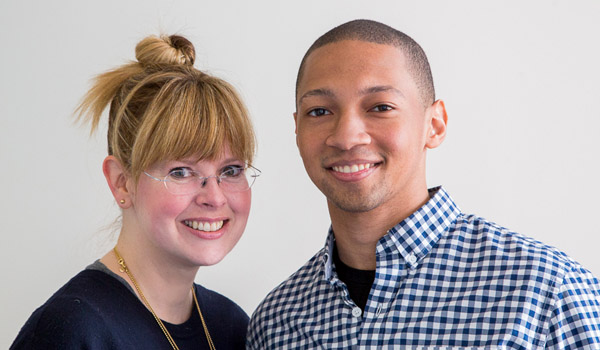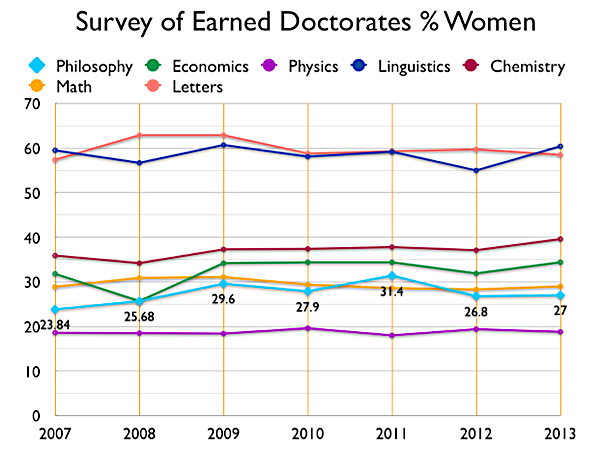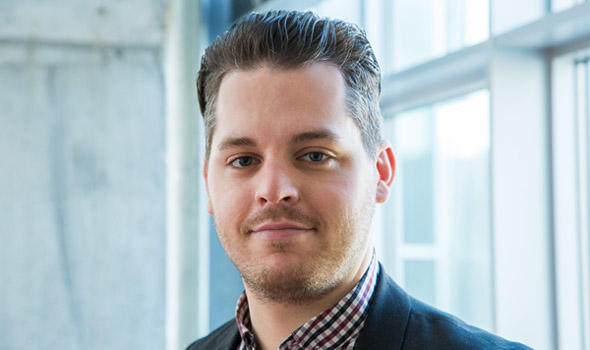Philosophy in an Inclusive Key
MIT grad students organize summer institute to increase diversity in philosophy field.

Abby Jaques and Kevin Richardson; Matthias Jenny is the third member of the team.
“We care very much about making the discipline as good as it can be.
— Abby Jaques
"One thing that makes MIT different from other places: It’s not at all an absurd thing for us to think, ‘There’s a problem here; let’s do something about it.'"
— Kevin Richardson
The academic pursuit of philosophy has a serious diversity problem.
As recently as 2010, fewer than 30 percent of those earning doctorates in philosophy were women, for example — a lower percentage than that for math, chemistry, or economics. The numbers of racial and ethnic minorities in philosophy are estimated to be even worse.
Three philosophy graduate students in MIT’s School of Humanities, Arts, and Social Sciences (SHASS) have rolled up their sleeves to tackle this problem. Abby Jaques, Matthias Jenny, and Kevin Richardson have organized a weeklong program that will bring a diverse cohort of undergraduates to the MIT campus this summer, where the students will explore the full range of options for pursuing an academic career in philosophy.
Philosophy in an Inclusive Key
“The overall philosophical profession, just like society at large, is still very much dominated by straight, white, cisgendered, able-bodied, middle-class men," observes Jenny. "Anyone who doesn’t fit all of these criteria often faces significant challenges when trying to enter and thrive in philosophy. This is both an injustice to the majority of people who don’t fit the above criteria and to the detriment of philosophy as a collective intellectual enterprise.”
Organized in partnership with the University of Massachusetts (UMass)-Boston, "Philosophy in an Inclusive Key Summer Institute" (PIKSI) Boston will take place August 2-8, 2015. Building on the success of PIKSI-Rock, a program run by the University of Pennsylvania’s Rock Ethics Institute, PIKSI-Boston will feature philosophy classes with a diverse range of faculty speakers — giving students the chance to see a variety of people at work in the field.
“You’re not always consciously noticing 'people like me aren’t here,' but you notice subconsciously,” Jaques says about being a woman in the male-dominated field. “We felt there was a real need for this program.”
Richardson, who is African-American, says he understands the benefits PIKSI can provide because he attended a similar summer program at Rutgers University when he was an undergraduate. “Going was really nice for me because often doing philosophy is not seen as something black people do,” he says.
Beneficial to individuals and to the field
The students stress that individuals aren’t the only ones who lose out when diverse voices are missing, however; those absences also hurt the field at large. "In philosophy, we’re reasoning on the basis of our own experiences. If all philosophers have similar experiences, their ideas converge — but this convergence might be because they share narrow cultural experiences, not because they all impartially reason to the same conclusion,” Richardson says.
“In a discipline where the project is to gain an understanding of the fundamental nature of the world and ourselves, you want to have as much of the world as possible — as many of us as we can muster — be a part of that process,” Jaques says.

Most recent data on women earning doctorates in philosophy
Infographic by Sally Haslanger, MIT Professor of Philosophy
A pluralistic enterprise
Guest speakers at PIKSI-Boston will include Susanna Siegel, the Edgar Pierce Professor of Philosophy at Harvard University; Jorge Garcia, professor of philosophy at Boston College; and Justin Khoo, assistant professor of philosophy at MIT, among others. Topics will run the gamut from traditionally central areas of analytic philosophy to contemporary specializations that push the boundaries of the discipline.
One goal, organizers say, is to ensure that the diverse cohort of undergraduates feels comfortable choosing careers from the full range of philosophical endeavors and does not feel pigeonholed into such areas as critical race theory, feminism, queer studies, disability studies, and the like. “We have a lot of areas covered — philosophy of language, philosophy of mind, ethics, feminist philosophy, history of philosophy,” Richardson says. “We’re making a concerted effort to be as pluralistic as possible.”
In addition to the faculty lectures, PIKSI-Boston will feature seminars led by graduate students and workshops on such topics as applying to graduate school and getting ahead in academia. These sessions will further two more goals of the summer program — to provide graduate students with practice teaching and to connect undergraduates to mentors.

“No matter where I end up teaching, having worked closely with undergraduates from highly diverse backgrounds will put me in a better position to understand the challenges faced by my future students."
— Matthias Jenny, MIT graduate student in philosophy
Creating community and mentors
“No matter where I end up teaching, having worked closely with undergraduates from highly diverse backgrounds will put me in a better position to understand the challenges faced by my future students,” says Jenny, who plans to become a philosophy professor.
“We want mentoring to continue after the summer,” Richardson adds, noting that the organizers favored students from New England in the selection process to help ensure that the relationships formed at PIKSI-Boston can be maintained. “We want to help them to get into the profession of philosophy.”
More than 200 students from a range of universities, interests, and backgrounds applied for this summer’s 20 program slots. Designated as Alain Locke Fellows in honor of the distinguished African-American philosopher, the undergraduates will have all their program expenses paid thanks to sponsorship from SHASS, MIT’s Department of Linguistics and Philosophy, the American Philosophical Association, the Mellon Foundation, and UMass-Boston’s Department of Philosophy.
“There are extraordinary people all over looking for a path into philosophy,” Jaques says. “If our applicants are the future of philosophy, philosophy looks great.”
The Haslanger effect
MIT SHASS was an early and enthusiastic supporter of PIKSI-Boston, providing the seed money that made this year’s launch possible. In addition, the students lauded the support and advice they received from Sally Haslanger, the Ford professor of philosophy, who drew on her connections in the field to gather the resources necessary to get the program off the ground so quickly. “This would not be possible without Sally Haslanger. She is a force of nature,” Jaques says.
Haslanger not only wrangled funding; she also proposed the partnership with UMass-Boston, which has linked PIKSI to a diverse population of undergraduates as well as program leadership. UMass Professors Lisa Rivera and Danielle Bromwich are serving as director and assistant director, respectively, of PIKSI-Boston.
The power of mens et manus culture
The mens et manus culture of MIT also deserves some credit for the program, the students say. “One thing that makes MIT different from other places: It’s not at all an absurd thing for us to think, ‘There’s a problem; here, let’s do something about it,’” Richardson says.
“It’s easy to look at an intractable problem and say, there’s nothing to be done. Sometimes, if you roll up your sleeves, something can be done,” Jaques says.
Going forward, the students say they hope PIKSI-Boston starts a trend in philosophy that catches on across the country. “Really, really long term we’re planting seeds, and we expect trees in 20 to 30 years. The thought is that with PIKSI-Boston and other programs, you’ll have more underrepresented minorities going to graduate school and eventually see more in the profession of philosophy,” Richardson says.
As Jaques says, “We care very much about making the discipline as good as it can be.”
Suggested Links
Philosophy in an Inclusive Key
MIT Graduate Students in Philosophy, 2015
Data on Philosophy | PDF compiled by Professor Sally Haslanger
MIT Philosophy
Sally Haslager, MIT Professor of Philosophy
Archive Stories
American Philosophical Association honors Judith Jarvis Thomson
Does time pass? MIT Philosopher Brad Skow's new book says it does — but not in the way you expect.
MIT Philosophy has outsized success in placing PhD grads in tenure track positions
Story prepared by SHASS Communications
Editor and Design Director: Emily Hiestand
Senior Writer: Kathryn O'Neill
Photographs by Jon Sachs, MIT SHASS Communications